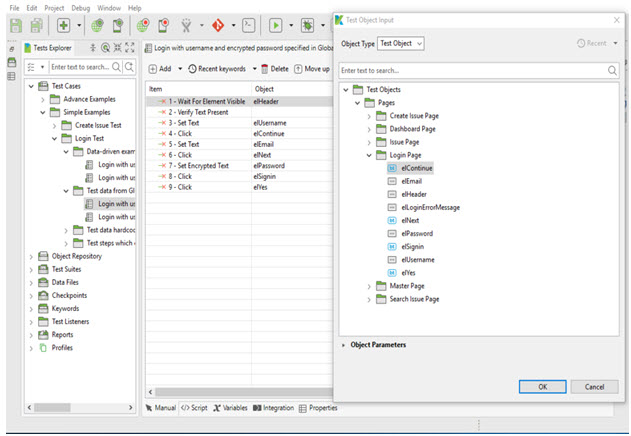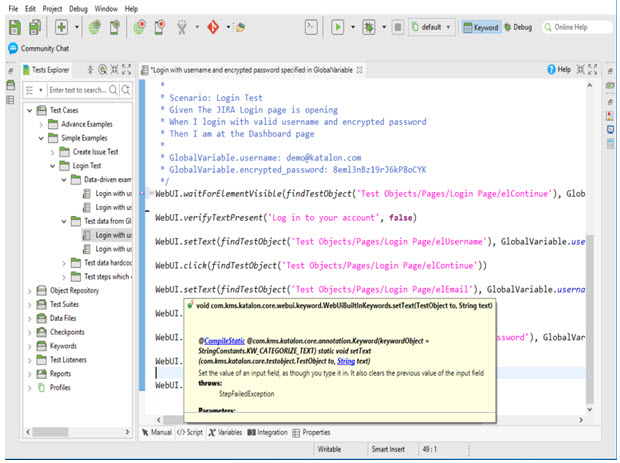Katalon Studio versus Selenium
Katalon Studio is a free and open-source test automation solution that strengthens Selenium’s core engine. Initially, the tool was built on top of Selenium so it inherits several functionalities of Selenium. Nevertheless, Katalon Studio has not been considered as a Selenium wrapper, but a powerful Selenium alternative. This blog post will compare between Katalon Studio and other Selenium-based frameworks by covering target users, deployment, scripting language support, and more.
1. Target Users
When testing with Selenium and Appium, coding skill is a must since their testing libraries are complicated. Before starting to write a test case, you need to use an IDE (e.g.Eclipse or Visual Studio) to import necessary libraries and frameworks into your project.
Unlike Selenium or Appium, Katalon Studio does not require programming knowledge from its users. Considering the friendly UI with manual mode, it turns all technical complexities into a friendly and powerful weapon. That is to say, you don’t need to be a testing expert or have solid knowledge about the application under test (AUT) to successfully handle tests in Katalon Studio. Still, if you want to expose yourself to coding, the scripting mode is available to support more technically powerful testings.
2. Deployment & Getting Started
Even though frameworks in Selenium, Appium, and Katalon Studio are packaged into ready-to-use tools, you still have to go through high-level steps to set up and run.
Here’s how:
Selenium:
• Download and install Java SDK
• Download and set up test libraries: Selenium client API of your preferred language, Selenium Server, or a standalone package (a bundle of client and server in only one library)
• Download IEDriver and ChromeDriver, set up the environment & PATH variables
• Download and set up the development IDE and your preferred testing frameworks like JUnit, NUnit and TestNG
• Go through the Selenium API document in order to start creating a project and writing some code.
Appium:
• Download and install your SDK programming language of Java, Python, Ruby or C#
• Download and set up test libraries (Appium, Node.js, Android SDK, XCode if Mac and iOS), set up the environment & PATH variables
• Download and set up the development IDE and your preferred testing frameworks like JUnit, NUnit and TestNG
• Go through the Selenium API document to start creating a project and writing some code
Katalon Studio:
• Install Appium, Node.js (on Windows) and XCode (on Mac) when testing mobile apps
• Documentations on docs.katalon.com helps you go through quickly from simple to advanced features
3. Test management and scripting language support
# Katalon Studio provides full syntax highlight, code suggestion, debugging for testers with limited programming skills.

(Katalon Studio manual mode)

(Katalon Studio scripting mode)
# On the other hand, although Selenium and Appium offer intuitive environments for developers, there are unfamiliar and unnecessarily complex features for manual and non-technical testers.

(The development-only mode of Selenium + TestNG + Eclipse)

(Test cases, Test suites, test data are mainly organized by XML files and programming codes)
Supported scripting language:
• Katalon Studio: Java/Groovy is the only option for now
• Selenium, Appium + an IDE: Many choices for scripting languages
Conclusion
These three tools are all top-ranked automation solutions. The main objective of test automation is to simplify the testing effort as much as possible with a minimum set of scripts. Thus, Katalon Studio was launched with the mission to provide affordable solutions for the software testing community. In whatever way, consider carefully to choose the suitable tool for your development projects.

An expert on R&D, Online Training and Publishing. He is M.Tech. (Honours) and is a part of the STG team since inception.
